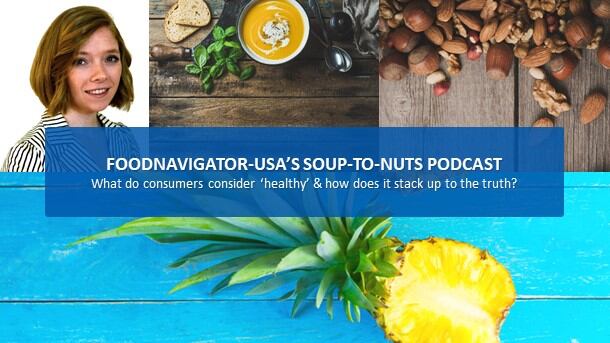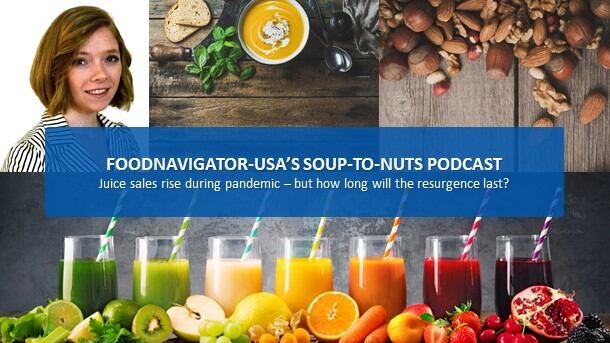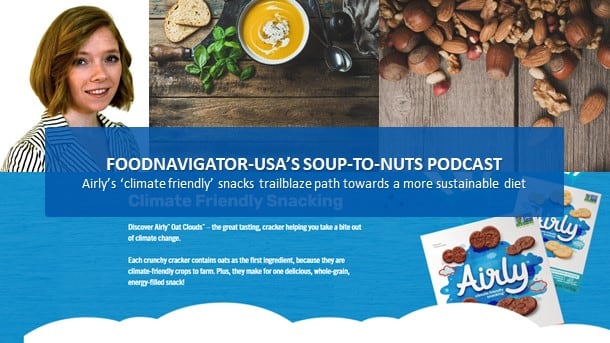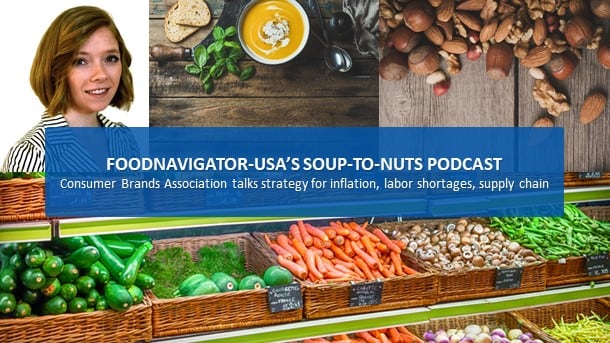According to Mintel research presented last month at IFT’s Time to Kick Start Healthy Eating virtual meeting, 52% of US consumers are concerned about strengthening their immune system and 47% are doing so by regularly consuming immune-boosting foods. This is up from only 27% who reported regularly consuming foods to support their immunity before the pandemic. And while Mintel research also shows that many consumers believe they eat healthy, most of them define ‘healthy’ as simply ‘fresh’ or having ‘no bad stuff.’
This is a “pretty narrow” definition, according to IFT President Noel Anderson who, in this episode of FoodNavigator-USA’s Soup-To-Nuts podcast, calls on the nutrition and healthcare communities to seize consumer interest in health and nutrition and better educate them about the Dietary Guidelines and what a healthy diet entails. He also urges more research into the relationship between diet and health to better substantiate marketing claims and asks the government to encourage healthy nutrition more directly.
[Editor’s note: Never miss an episode of FoodNavigator-USA’s Soup To Nuts Podcast – subscribe today.]
The time to act is now
After more than a year of eating and cooking almost exclusively at home with a focus on supporting their physical and mental wellbeing during the pandemic, many Americans may be less physically fit than before the pandemic with many now grappling with what Anderson calls the “COVID-15.” He explains that the addition of 15 pounds or more during the pandemic has created another health crisis that is just as dangerous and in need of fast action as the coronavirus.
“I don't think there's a deep understanding about what healthy eating really means to the common consumer. Research has shown that consumers are more aware and claim that they want to eat healthy, but to many of them eating healthy simply means fresh, but has no bad stuff in it. That's a pretty narrow definition. Furthermore, when you look at their behaviors it still indicates that taste is still king deliciousness drives purchases, and that that's their behaviors. That's how they make their purchasing decisions,” Anderson said.
He added: “While consumers expressed the desire to eat more healthy foods and foods that would boost their immune system, I don't know that it really worked out that way. And at the end of the day, things I've been reading more recently is that people, the COVID 15 or the COVID 20 has been very prevalent. People actually gained weight. Most many people actually gained weight during this time period.
We are in yet another crisis, more than 70% of Americans over age 20 are overweight today and fully one third of Americans over age 20 are obese.”
While lauding the food and beverage industry’s “tremendous skill set when it comes to marketing,” Anderson said he believes much of this effort currently is misplaced and instead of helping consumers, may actually be hurting them and even sowing seeds of distrust that could hurt industry later.
He explained that when food companies take marketing claims that directly or indirectly imply the health of an ingredient or product that goes beyond the supporting science it creates distrust in the entire food industry.
When brands do talk about nutrition through their packaging, Anderson says he would like them to stick to the facts and ditch misleading implied claimed that play to consumer fears, desires or misconceptions about specific ingredients or production practices.
“I think they need to be held to a higher standard, perhaps they shouldn't be allowed to make implicit claims those that state, you know, it contains antioxidants or whatever, or more specifically what it does not contain. I think claims these imply that these foods are healthier for you, yet many aren't supported by sound peer reviewed science and not only as an individual component, but within the context of an individual's diet will really make a difference when you consume this can of functional beverage or not. I think the jury is still out,” he said.
Unbiased research is needed
With this in mind, he called on industry and nutrition stakeholders to invest in more research about the impact of antioxidants on health, food on the microbiome and nutrition on the immune system.
As desperately needed as more research is, Anderson notes it needs to be conducted in a way that removes any risk or perception of bias – which is where he says the government needs to step up.
“I do believe that we need to do much more research, that is hopefully government sponsored so there's no perceived biases, … on food as medicine. I think there's a lot there, but it has to be vetted thoroughly, and out of that science, hopefully, can come become claims and allow us to say things that were really make a difference in the human condition based on sound science,” he said.
Anderson also called on the Biden Administration to build upon its expand its public health messaging beyond the pandemic and vaccination to once again shine a spotlight on the obesity epidemic, similar to what former First Lady Michelle Obama did with Partnership for a Healthier America when Barak Obama was president.
Likewise, he said, he would like to see increased subsidies for growing nutritious food that people need more of – not just corn, soy and sugar.
Is innovation or renovation a better strategy for improving nutrition?
In addition to investing in research and refining marketing, Anderson called on industry to better meet Americans' nutritional and health needs through new product innovation – which he suggested could be faster and more effective than renovating existing products to have better profiles.
“It's extremely hard to change products in any way without impacting the consumers perceived value or impression of that product. So, if we make products that are designed to be delicious, and then we want to make them healthy, we have to change that product. Anytime you change that product, typically the consumer or the heavy user consumer will pick that up, and typically not like that change,” Anderson said, adding: “That's where food science comes to play. I think our job is to deliver both great taste and delicious this with those two health and wellness benefits.”
Historically, food scientists have used stealth health to slowly improve the nutrition of products with the hope no one will notice. Or they make bold changes and bold claims that appeal to consumer desire for better nutrition.
Unfortunately, Anderson said, neither approach works well.
He explained: “The biggest opportunity is to start fresh with a brand new product and create new brands that stand for themselves. So that neck way, you're worried about having to change tastes to deliver health and wellness. You start with the health and wellness and do what you can to make it taste great. Um, so if you start working with lower sodium and having more fiber in these products and you designed deliciousness, I think just by turning it around and looking it that way, developing products, that way, they're going to have a much higher chance for success.”
Anderson said he also sees tremendous opportunity to create convenient, affordable and delicious products with more fiber, which many Americans fail to consume enough of and which is gaining more interest from consumers.
While Anderson sees significant room for improvement in meeting Americans’ health and nutrition needs, he also says he is optimistic about public and private players coming together to meet consumer demand for more information and products that promote healthy lifestyles.




